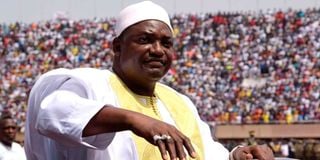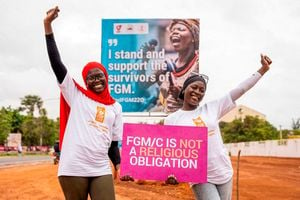
Gambian President Adama Barrow's government has endorsed the candidature of Momodou Tangara for the Commonwealth Secretary General position.
.
When the elections for the next Secretary General of the Commonwealth come up next month, Africa will almost be assured of taking the mantle it last did 24 years ago.
But the race has turned into a three-candidate battle after the continent’s ‘Club’ members failed to agree on one runner.
Three candidates are vying for the position in October, and they come from Gambia, Ghana and Lesotho. The decision is expected at the next Commonwealth Heads of Government meeting (Chogm), comprised of 56 states that include the UK and mostly its former colonies (although Rwanda, Mozambique, Gabon and Togo have since joined).
Member states will appoint the 7th Secretary-General in elections that will be conducted at Chogm in Samoa, from October 21 to 25.
Gambia’s candidate, Momodou Tangara initially thought he had secured his country’s support as a crucial launch pad. Then his people raised objections, owing to a past unenviable baggage they think will bring the country into disrepute.
Tangara is the current Minister of Foreign Affairs but has been facing opposition from home, even though the government of President Adama Barrow government endorsed him.
A group of people calling itself Concerned Gambians and Citizens of the Commonwealth has issued a petition to the leadership of the Commonwealth, calling for his disqualification, due to his ties to former Gambian strongman, Yahya Jammeh.
Tangara, though, has survived previous crises, earning the title of the proverbial cat with nine lives. He served in various capacities under the exiled former president’s regime, including as Foreign Minister. And when the change occurred, he again got himself top spots in the new administration.
Tangara began his career as a journalist, then an NGO activist, before joining the government under Jammeh. He served as a diplomat in the United Nations and then at various levels of government, including foreign minister and minister for Higher Education.
He has been a minister under the Barrow administration since 2018.
Future of the Commonwealth
To be fair, it is Jammeh whom most people feared most, and accused most of atrocities. He has been in exile since 2017 in Equatorial Guinea and is accused of human rights violations during his two-decade rule. Several of his associates have been indicted and some are facing trial abroad.
While Tangara wasn’t named in any crime, critics say he enabled the crimes by misleading the international community on human rights abuses in the country while he served as the country’s UN permanent representative and as Foreign Minister.
Under Jammeh, The Gambia severed ties with the Commonwealth. The country was only readmitted after the change of regime in 2017.
“The group believes that opposing Mr Tangara’s candidacy is not just to ensure that he does not get the position but that it is crucial to make the point that there will always be a price for the self-serving actions that public officials take, that there will always be a day of reckoning, and that as citizens, we will never forget – that power ultimately belongs to the people,” the petitioners noted in a statement.
Neither Tangara, nor the government has publicly responded to the petition.
But the government appears to be aware of what is at stake, given the formidability of his opponents in the race. So they have launched a campaign designed to clean his image.
On Wednesday, September 11, all three candidates faced each other for a debate at Chatham House in London, where they presented their vision for the future of the Commonwealth.
The composition of the candidates indicates a battle between two regional blocs: SADC and ECOWAS. And it becomes problematic for the two West African candidates as the bloc is divided over their candidacy.
Ghana’s candidate, Shirley Ayorkor Botchwe, who currently serves as Foreign Minister, is a strong contender. And her gender may give her an added advantage.
Strongest advantage
Her country has also indicated it will leave no chance unexploited to see her through.
In July, Ghanaian President President Nana Akufo-Addo flew into Banjul for what was described as an official visit to promote bilateral relations.
But it later turned out that he was there to prevail on his Gambian counterpart for his Foreign Minister to step down. However, according to media reports, Barrow made it clear that Tangara would not step down.
Supporters of Tangara insist that he was the first to announce his candidate, in September 2023, whereas the Ghanaian announced hers in March 2024.
Lesotho’s candidate Joshua Setipa also has a unique advantage in that he is an insider in the Commonwealth, as a serving Senior Director of Strategy, Portfolio Partnership, and Digital Division in the Secretariat.
His strongest advantage, however, is that his candidacy is backed by SADC.
The position is usually rotated between the five regions of the world, according to the revised Commonwealth charter.
British lawyer Patricia Scotland is set to complete her second and final term under the European region’s slot that started in 2016.
The last time an African held the position was from 1990 to 2000 when veteran Nigerian diplomat Chief Emeka Anyaoku served as the third Secretary General.
Common good of its members
Africa makes up more than a third of the Commonwealth’s 2.7 billion citizens.
Critics say the organisation which is rooted in the British Empire, is a neocolonial entity that only seeks to continue the legacy of colonialism.
Founded in 1931, the Commonwealth was initially a club for the United Kingdom and citizens of its former territories, with the stated objective of working together for the common good of its members. Initially, the English language was the only factor that bound them.
But today, any country can join it, thanks to amendments to its founding charter. The last two countries to join the group were Gabon and Togo in 2022, both former French colonies.
Years of relative dormancy of the organisation made it difficult to defend against the characterisation of a vestige of colonial influence.
But it lately sought to up its game, participating in the improvement of democratic tenets in member countries, notably through elections observation missions. It also seeks to advance education as one of its tenets, through scholarships for Commonwealth citizens. The Commonwealth Games also remains a much-needed vehicle for cultural exchange through sports.
The leadership of Patricia Scotland in the last eight years as Head of the Secretariat was punctuated by Covid-19 and her battle against allegations of corruption.
Originally from Dominica (not to be confused with the Dominican Republic), Scotland moved to the UK at a young age, where she was raised and became a career lawyer and politician.
The next Secretary-General may have to work on the relevance of the organisation and to reboot the confidence of top-budget-contributing countries like Canada, Australia and New Zealand in the bloc that is often called the ‘club.






